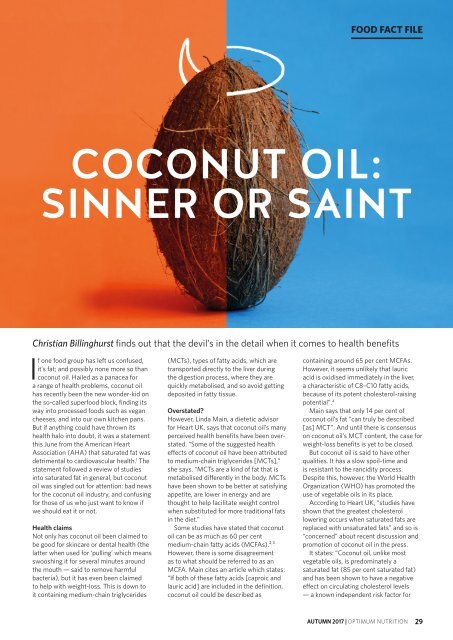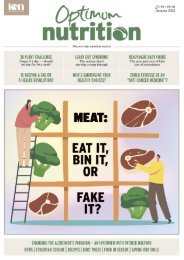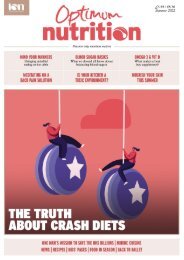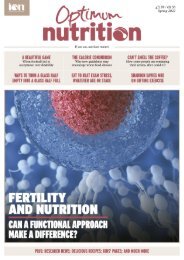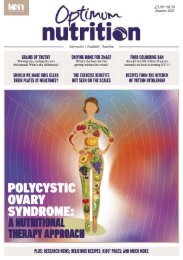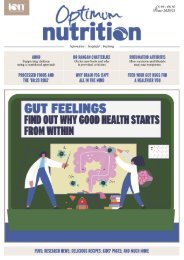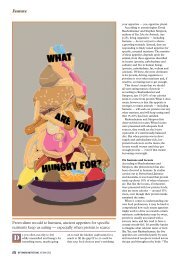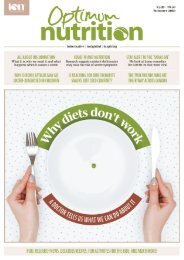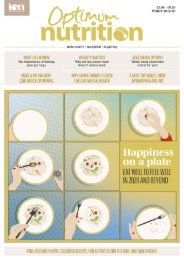You also want an ePaper? Increase the reach of your titles
YUMPU automatically turns print PDFs into web optimized ePapers that Google loves.
FOOD FACT FILE<br />
Christian Billinghurst finds out that the devil’s in the detail when it comes to health benefits<br />
If one food group has left us confused,<br />
it’s fat; and possibly none m<strong>or</strong>e so than<br />
coconut oil. Hailed as a panacea f<strong>or</strong><br />
a range of health problems, coconut oil<br />
has recently been the new wonder-kid on<br />
the so-called superfood block, finding its<br />
way into processed foods such as vegan<br />
cheeses, and into our own kitchen pans.<br />
But if anything could have thrown its<br />
health halo into doubt, it was a statement<br />
this June from the American Heart<br />
Association (AHA) that saturated fat was<br />
detrimental to cardiovascular health. 1 The<br />
statement followed a review of studies<br />
into saturated fat in general, but coconut<br />
oil was singled out f<strong>or</strong> attention: bad news<br />
f<strong>or</strong> the coconut oil industry, and confusing<br />
f<strong>or</strong> those of us who just want to know if<br />
we should eat it <strong>or</strong> not.<br />
Health claims<br />
Not only has coconut oil been claimed to<br />
be good f<strong>or</strong> skincare <strong>or</strong> dental health (the<br />
latter when used f<strong>or</strong> ‘pulling’ which means<br />
swooshing it f<strong>or</strong> several minutes around<br />
the mouth — said to remove harmful<br />
bacteria), but it has even been claimed<br />
to help with weight-loss. This is down to<br />
it containing medium-chain triglycerides<br />
(MCTs), types of fatty acids, which are<br />
transp<strong>or</strong>ted directly to the liver during<br />
the digestion process, where they are<br />
quickly metabolised, and so avoid getting<br />
deposited in fatty tissue.<br />
Overstated?<br />
However, Linda Main, a dietetic advis<strong>or</strong><br />
f<strong>or</strong> Heart UK, says that coconut oil’s many<br />
perceived health benefits have been overstated.<br />
“Some of the suggested health<br />
effects of coconut oil have been attributed<br />
to medium-chain triglycerides [MCTs],”<br />
she says. “MCTs are a kind of fat that is<br />
metabolised differently in the body. MCTs<br />
have been shown to be better at satisfying<br />
appetite, are lower in energy and are<br />
thought to help facilitate weight control<br />
when substituted f<strong>or</strong> m<strong>or</strong>e traditional fats<br />
in the diet.”<br />
Some studies have stated that coconut<br />
oil can be as much as 60 per cent<br />
medium-chain fatty acids (MCFAs).² , ³<br />
However, there is some disagreement<br />
as to what should be referred to as an<br />
MCFA. Main cites an article which states:<br />
“If both of these fatty acids [caproic and<br />
lauric acid] are included in the definition,<br />
coconut oil could be described as<br />
containing around 65 per cent MCFAs.<br />
However, it seems unlikely that lauric<br />
acid is oxidised immediately in the liver,<br />
a characteristic of C8–C10 fatty acids,<br />
because of its potent cholesterol-raising<br />
potential”. 4<br />
Main says that only 14 per cent of<br />
coconut oil’s fat “can truly be described<br />
[as] MCT”. And until there is consensus<br />
on coconut oil’s MCT content, the case f<strong>or</strong><br />
weight-loss benefits is yet to be closed.<br />
But coconut oil is said to have other<br />
qualities. It has a slow spoil-time and<br />
is resistant to the rancidity process.<br />
Despite this, however, the W<strong>or</strong>ld Health<br />
Organization (WHO) has promoted the<br />
use of vegetable oils in its place.<br />
Acc<strong>or</strong>ding to Heart UK, “studies have<br />
shown that the greatest cholesterol<br />
lowering occurs when saturated fats are<br />
replaced with unsaturated fats” and so is<br />
“concerned” about recent discussion and<br />
promotion of coconut oil in the press.<br />
It states: “<strong>Coconut</strong> oil, unlike most<br />
vegetable oils, is predominately a<br />
saturated fat (85 per cent saturated fat)<br />
and has been shown to have a negative<br />
effect on circulating cholesterol levels<br />
— a known independent risk fact<strong>or</strong> f<strong>or</strong><br />
AUTUMN 2017 | OPTIMUM NUTRITION<br />
29
FOOD FACT FILE<br />
cardiovascular disease [CVD].” It goes<br />
on to state: “As much as 90 per cent of<br />
the fat in coconut oil is saturated, 6 per<br />
cent monounsaturated and 1.5 per cent<br />
polyunsaturated fat.<br />
“Compare this with the saturated fat<br />
content of butter (52 per cent) and palm<br />
oil (50 per cent).”<br />
A cholesterol conundrum<br />
Policy guidelines promoted by the WHO<br />
and the AHA state that saturated fats<br />
such as coconut oil raise cholesterol and<br />
theref<strong>or</strong>e increase the risk of CVD.<br />
However, whilst human trials have<br />
demonstrated that coconut oil increases<br />
both total cholesterol and LDL (so-called<br />
‘bad’ cholesterol) levels, one review stated<br />
that better indicat<strong>or</strong>s f<strong>or</strong> measuring<br />
CVD risk (such as LDL-HDL ratio and<br />
triglyceride levels) were not affected even<br />
when comparing coconut oil to ‘healthy’<br />
vegetable oils and ‘unhealthy’ butter. 5<br />
So, confusingly f<strong>or</strong> the consumer, there<br />
is a growing opinion that the evidence<br />
associating saturated fats and CVD is<br />
inconclusive, as emerging studies appear<br />
to debunk traditional thinking. 6<br />
Following the AHA’s statement, some<br />
doct<strong>or</strong>s and scientists were quick to<br />
question it. One critic is cardiologist and<br />
co-auth<strong>or</strong> of The Pioppi Diet, Dr Aseem<br />
Malhotra, who told Optimum Nutrition:<br />
“My responsibility is to patients and<br />
scientific integrity, and when you look at<br />
the evidence the first thing to say is that<br />
there is no evidence at all that saturated<br />
fats clog the arteries.” That “myth”, he<br />
says, has been “busted”.<br />
Using coconut oil needs<br />
to be taken in the context<br />
of “a healthy eating<br />
package”<br />
He also questions the AHA’s statement<br />
as being based on “po<strong>or</strong> science” and<br />
cherry picked studies from decades<br />
ago — although ‘cherry picking’ data is a<br />
common accusation from both sides of<br />
the fat debate.<br />
Busted?<br />
“Of course coconut oil will affect<br />
[cholesterol],” says Malhotra. “It varies<br />
from person to person.” But data, he<br />
says, shows that when it raises LDL,<br />
it also increases HDL (so-called good<br />
cholesterol). And a high LDL level is not<br />
necessarily associated with heart disease.<br />
<strong>Coconut</strong> oil consumption needs to be<br />
taken in the context of “a healthy eating<br />
package”, he says. “So that as long as you<br />
are following what I recommend, which<br />
is kind of a low refined carbohydrate<br />
Mediterranean diet, having some coconut<br />
oil is not going to cause you a problem.”<br />
Malhotra also questions the economic<br />
background to the AHA’s rep<strong>or</strong>t. “You<br />
have to question their motives when<br />
they are an <strong>or</strong>ganisation that receives a<br />
considerable amount of money from the<br />
drug industry. There is a huge industry<br />
that has developed around cholesterollowering<br />
drugs.”<br />
This is an observation put f<strong>or</strong>ward<br />
by other critics, as it is noted that the<br />
AHA review was part-funded by maj<strong>or</strong><br />
manufacturers of cholesterol-lowering<br />
medications, the Canola <strong>Oil</strong> Council, and<br />
the Calif<strong>or</strong>nia Walnut Commission 1 (all of<br />
which was declared).<br />
“The other thing that is really<br />
concerning,” says Malhotra, “is promoting<br />
the consumption of vegetable oils <strong>or</strong><br />
industrial seed oils on the basis that<br />
they lower cholesterol as effectively as<br />
statins.” He says that trials that lowered<br />
cholesterol by dietary changes, such as<br />
increasing vegetable oil consumption,<br />
did not reduce death rate, heart attack <strong>or</strong><br />
the risk of stroke. Beyond the cholesterol<br />
debate, however, Malhotra says he can<br />
only look at the best available evidence<br />
that is there. “Like anything obviously<br />
consumed in moderate amounts, it is not<br />
harmful.<br />
“I have a tablespoon of coconut oil in<br />
my coffee every m<strong>or</strong>ning. It keeps me<br />
full, it gives me energy... whatever, a nice<br />
replacement f<strong>or</strong> sugar which is obviously<br />
much w<strong>or</strong>se.”<br />
Good f<strong>or</strong> all?<br />
Claims of other health benefits include<br />
coconut oil being associated with a<br />
reduced risk of Alzheimer’s disease.<br />
One study found that anti-inflammat<strong>or</strong>y<br />
components in coconut oil can pass the<br />
blood-brain barrier with neuroprotective<br />
effects. 7 However, the study in question<br />
only focussed on populations that already<br />
consumed large amounts of coconut oil.<br />
Similarly, studies that have associated<br />
coconut oil consumption with reduced<br />
cancer risk have tended to be conducted<br />
on animal models <strong>or</strong> non-western<br />
populations where overall diet and<br />
lifestyle may differ from that in the west.<br />
Lifestyle fact<strong>or</strong>s may make all the<br />
difference. F<strong>or</strong> example, whilst coconut<br />
oil is said to be better f<strong>or</strong> cooking than<br />
other vegetable oils because it is resistant<br />
to oxidation and polymerisation (when<br />
small molecules join together to make<br />
long molecules, so result in a change in<br />
the chemical structure), this benefit is lost<br />
when cooking at high temperatures —<br />
such as in deep frying. Despite its stability,<br />
coconut oil also has a low smoke point<br />
(171C/350F) 8 which is the temperature at<br />
which it produces smoke and toxins, so is<br />
only suitable f<strong>or</strong> gentle <strong>or</strong> mid-heat frying.<br />
As f<strong>or</strong> beneficial antimicrobial<br />
properties, research has shown coconut<br />
oil can inhibit the growth of harmful<br />
bacteria at a cellular level which, in the<strong>or</strong>y,<br />
30 OPTIMUM NUTRITION | AUTUMN 2017
FOOD FACT FILE<br />
“I would not go as far<br />
as to say that it’s a<br />
superfood and it has all<br />
these other properties”<br />
would help with diarrhoea caused by<br />
antibiotic use. 9 However, such studies<br />
have so far only been in small lab tests,<br />
and human studies have not shown<br />
any significant beneficial changes. It is<br />
perhaps no wonder that Heart UK states<br />
that the “health benefits of coconut oil are<br />
definitely over hyped”.<br />
“I would not go as far as to say that<br />
it’s a superfood and it has all these other<br />
properties,” says Malhotra. “There may be<br />
some evidence there, but I can’t go that<br />
far. But what I can say — as a cardiologist<br />
— is that consuming coconut oil in<br />
moderation as a part of what I call a low<br />
refined carbohydrate Mediterranean diet,<br />
will not do you any harm.<br />
“I wouldn’t go as far as saying that I can<br />
tell you it is very good f<strong>or</strong> you — that it<br />
is good f<strong>or</strong> your health, but it can be very<br />
much part of a healthy diet.”<br />
And it is probably such advice that we<br />
need to keep in mind. <strong>Coconut</strong> oil is only<br />
a tiny part of a much bigger picture, and<br />
if we are living on a diet of chips and little<br />
else, then frying them in coconut oil isn’t<br />
going to turn them into a healthy option.<br />
Cold pressed, virgin <strong>or</strong> extra virgin? If you have wondered which to buy, you are<br />
not alone. We contacted several coconut oil companies to find out what the<br />
difference was between these labels but received little response. One industry<br />
insider who did not wish to be named said that there was “almost no difference”<br />
between extra virgin and virgin coconut oil. Another said that extra virgin coconut oil<br />
was higher quality, but was unable to elab<strong>or</strong>ate as to why. Still confused, we res<strong>or</strong>ted to<br />
the internet.<br />
One commentat<strong>or</strong>, writing in coconutoil.com, says: “the only truly ‘unrefined’ coconut<br />
oil you can consume is the oil still inside the coconut meat from a fresh coconut just<br />
picked off the tree”, 10 and that coconut oil can only be produced by three different<br />
methods: refined, bleached and deod<strong>or</strong>ised (RBD); cold pressed; <strong>or</strong> wet milled.<br />
Wet milled is considered to be the best because it does not require drying and heavy<br />
refinement. Research has shown that wet milled coconut oil contains higher amounts of<br />
antioxidants, but health comes at a price because this tends to be the most expensive. 11<br />
At the other end of the spectrum; RBD uses higher temperatures to extract the oil<br />
from the coconut meat (between 70-80C), and then treatment with chemicals to get rid<br />
of impurities and to deod<strong>or</strong>ise it, but it is also the cheapest.<br />
Cold pressed extraction is similar to RBD but uses lower temperatures to extract the<br />
oil (
Enjoyed reading this article?<br />
Subscribe and read the full digital magazine f<strong>or</strong> free at ion.ac.uk/digital<br />
www.ion.ac.uk | info@ion.ac.uk | 020 8614 7800 | institutef<strong>or</strong>optimumnutrition | @ion_nutrition | @ion_nutrition<br />
Institute f<strong>or</strong> Optimum Nutrition is an independent educational charity. Registered company number 2724405, registered charity number 1013084


